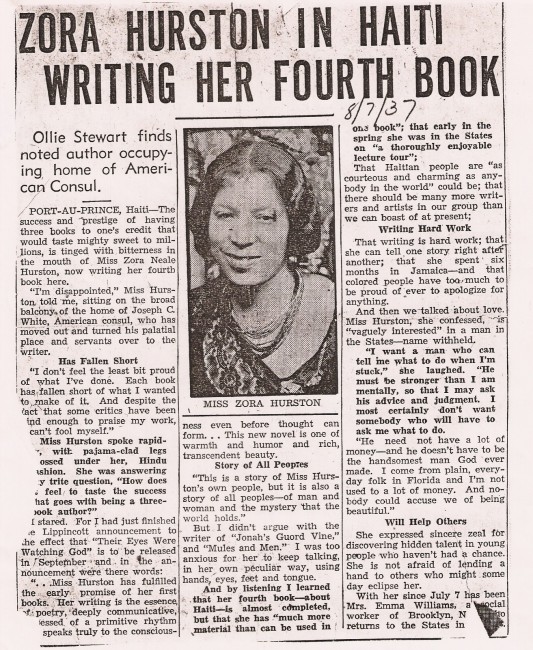Zora Neale Hurston’s Their Eyes Were Watching God reflects the in-depth research that Hurston had done to form a well-adapted representation of the African American English (AAE) dialect in Central Florida.
The importance of Hurston’s dialectical research reflects on the misrepresentation of dialects that teeter on the verge of racist or stereotypical. The history that revolves around Ebonics or AAE is often looked down upon as being a sign of being uneducated or illiterate. Often the criticism is rooted in America's long, dark history of racism. However, Hurston develops her novel by examining, authenticating, and embracing the distinctive features of vocabulary, grammar, and pronunciation of Central Florida’s AAE dialect by immersing herself in the culture and having grown up in the area.
According to Barry Betsy, Hurston reportedly spent multiple years in Eatonville, Florida collecting folklore from the residents while secretly identifying the dialectical nuances of their speech. This methodic practice enhanced the Central Florida AAE dialect without giving cause to the real nature of her research.
Hurston’s dialect reflects the standardized forms for AAE while touching on the variations that the Eatonville AAE dialect has. Rather than assuming that the dialect spoken in Central Florida uses the standardized “rules” of AAE, Hurston defies those standards by documenting and researching the town. As Manuela Coppola argues, she notes that Hurston includes the elements of speech, but also the idioms, metaphors, and prominent variations in sentence structures.
To fully develop a concrete, credible, and realistic study on language, it is important to immerse oneself into the culture to avoid using stereotypes or assumptions. In an article written by Tracey Weldon, she cites research by Baugh (1983) that encourages linguistic researchers to study the communities of speakers who dwell in the area of research.
By immersing herself in the culture of the community she writes about, whether part of her fictional or nonfiction work, Hurston is developing a direct and true essence of the people. Having grown up in Eatonville, Florida and then later returning to the area for research, Hurston is working with two dimensions. A personal history with the town as well as the influences of other people in the community. To work solely from her own experience would not provide an accurate dialect because she would be working with only one person. In studying the community through the folklore, she not only gains a greater understanding for the AAE dialect in Eatonville, but also gains a sense of phrases, history, and tradition that adds flavor to the language.

Hi Skylar!
ReplyDeleteYour blog post was very informative on a novel that I haven't read before and how it features the elements of AAE. It seemed that Zora Hurston was someone who wanted to further her studies and not write entirely from personal experience alone. That is admirable as the AAE language has faced its share of criticism and any author that chooses to write with it is noteworthy and taking a chance in the literary world it seems. It is not something that is done often, I enjoyed reading how Hurston wanted to connect with the people and her novel "Their Eyes Were Watching God" is a reflection of that and AAE.
Skylar,
ReplyDeleteI found it really interesting when you bring up the point of Hurston being influenced by her own personal history of the town along with others influence. I think it’s really cool she was able to use her research and apply it to her hometown, and it shows just how passionate she is about the subject. I also wrote on AAE and read on the bias around the dialect due to racism. You had a lot of information in your piece and put it together very well I really enjoyed reading it!
Thanks for your research!